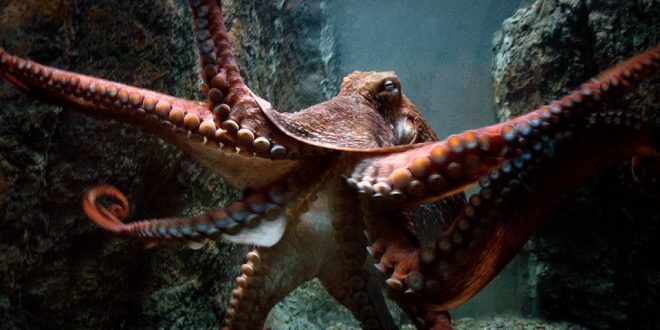Octopus, squid and cuttlefish don’t always follow the rules laid out in their DNA. Straying from prescribed genetic instructions may have increased the cephalopods’ thinking prowess, but comes at a cost, a new study suggests.
Scientists have found several species of octopus, cuttlefish and squid can rewrite their RNA, the molecular middle men in the manufacture of proteins. The finding, published today in the journal Cell, means they routinely produce proteins not listed in their genetic blueprints.
The researchers believe the mechanism enables the animals to adapt to abrupt temperature changes, and could explain why they are smarter than other invertebrates. But it comes with a trade-off, trapping them in an evolutionary time warp.
RNA, or ribonucleic acid, plays a crucial role in the production of the proteins creatures need to live and grow. Information stored in DNA is copied to RNA molecules, which generate the proteins that do the body’s work. But this process can be subverted in some parts of the genome, with the RNA “edited” before the proteins are produced.
In humans, the instructions from a few dozen of our 20,000-odd protein-coding genes can be manipulated in this way.
In 2012, researchers found that an Antarctic octopus species regularly used RNA editing to enable crucial nervous system proteins to function at low temperatures. Several years later a squid was found to have the same ability.
The new study, by Israeli and American researchers, has revealed just how extensively this trick is used. The team found that at least 11,000 of the squid’s 20,000 protein-producing genomic sites were amenable to editing.
“Basically, this is a mechanism to make proteins that are not encoded in the DNA,” said co-author Eli Eisenberg, a biophysicist at Tel Aviv University.
The team found that two octopus species, one squid and the common cuttlefish all shared this ability. All are from the “coleoid” subclass of molluscs, known for complex hunting and social behaviours. As the proteins involved are used in neural processes, the researchers suspect the ability may contribute to the animals’ intelligence.
However, the study also revealed that the molecular structures that allowed RNA editing also prevented mutations to DNA, the normal process by which creatures evolve.
“Mutation is usually thought of as the currency of natural selection,” said team leader Joshua Rosenthal. “These animals are suppressing that to maintain recoding flexibility at the RNA level.”
Agencies/Canadajournal
 Canada Journal – News of the World Articles and videos to bring you the biggest Canadian news stories from across the country every day
Canada Journal – News of the World Articles and videos to bring you the biggest Canadian news stories from across the country every day



